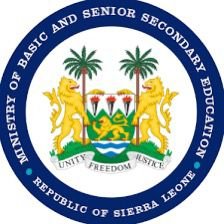By Mahmud Tim Kargbo
The deep roots of governance
In Washington, periodic calls to abolish the Department of Education are largely theatrical, intended to stir partisan applause: “Abolish the Department of Education”.
http://www.nytimes.com. In Sierra Leone, such talk would be reckless. Here the debate is not whether education should exist, but how to transform it, because it is anchored in law, shaped by history, and bound to the fragile inheritance of a post-war republic.
The Ministry of Basic and Senior Secondary Education is not a decorative bureaucracy, it is a legal and constitutional necessity. By statute it is responsible for curriculum and assessment, teacher recruitment and deployment, school feeding, transportation, inspection, safeguarding and school health. “The Basic and Senior Secondary Education Act 2023 places these duties firmly in law” http://www.parliament.gov.sl. To dismantle the ministry would breach legislation and unravel the institutional fabric that keeps the nation’s schools functioning.
From independence to the Margai years
At independence in 1961, Sierra Leone inherited a divided system. Mission schools brought rigour and discipline, while state schools were often underfunded and poorly managed. “Sir Milton Margai treated education as a cornerstone of nation-building, expanding teacher training and rural schooling” http://www.sierra-leone.org. His successor, Sir Albert Margai, politicised the sector. “Critics accused him of using education appointments for political patronage” http://www.unesco.org. That struggle revealed a dilemma that has never disappeared: should education policy serve the citizen or the politician?
Colonial legacies and neocolonial constraints
“Mission schools and colonial policy emphasised literacy for clerical service and catechism rather than broad scientific or technical training” http://unesdoc.unesco.org. “English-medium schooling privileged examination success over locally relevant curricula” http://www.waecinternational.org.
After independence, new constraints arrived. “From the early 1980s, structural adjustment programmes prioritised austerity and liberalisation, cutting education budgets and compressing teacher wages” http://www.unicef.org/reports/adjustment-human-face. “Donor-driven projects often set narrow objectives and short funding cycles, fragmenting national planning” http://www.unesco.org/gem-report. “Scholarships and credentialing pathways drew talent abroad, accelerating brain drain” http://documents.worldbank.org. None of this absolves domestic leaders of responsibility, but it shows how external finance and policy templates narrowed the room for locally grounded reform, particularly for rural and technical education.
“These legacies explain why the ministry must be strengthened, not stripped, so Sierra Leone sets its own standards, funds its own priorities, and engages with partners on its own terms” http://www.globalpartnership.org.
Decline under Stevens and the military
“The Truth and Reconciliation Commission found that exclusion from education was both a cause and consequence of the war” http://www.sierraleonetrc.org. Under Siaka Stevens, education was subordinated to political survival. “Teachers went unpaid and funding collapsed, leading to a lost generation” http://www.unesco.org.
Kabbah and post-war rebuilding
“When President Ahmad Tejan Kabbah took office in 1996, the system had all but collapsed” http://documents.worldbank.org. “In 2001, his government abolished tuition fees for primary schools, making basic education free and compulsory” http://www.parliament.gov.sl. “The Education Act 2004 modernised the framework and established the NCTVA” http://www.parliament.gov.sl. “The Sababu Education Project delivered infrastructure to deprived districts with World Bank support” http://documents.worldbank.org. By 2007, “school enrolment had more than doubled compared to the late 1990s” http://www.unesco.org.
Reform under Koroma and expansion under Bio
“From 2007 to 2018, education spending rose from 3.7 percent to more than 15 percent of the national budget” http://www.auditservice.gov.sl. “President Julius Maada Bio launched the Free Quality School Education programme in 2018, abolishing tuition and examination fees” http://www.mbsse.gov.sl. “Enrolment rose from under two million to over three million within three years” http://www.unicef.org/sierraleone. “Gender parity was achieved across levels” http://www.unicef.org/sierraleone. In 2021, “the Radical Inclusion Policy guaranteed access for pregnant girls, children with disabilities and those in remote areas” http://www.mbsse.gov.sl.
Public sentiment
“Afrobarometer reports that seventy three percent of citizens have benefited from the Free Quality School Education” http://www.afrobarometer.org. “Seventy four percent judge the government’s handling of education as satisfactory or better, compared with thirty eight percent in 2015” http://www.politicosl.com. “Fifty three percent believe quality has improved, but call for further progress” http://www.afrobarometer.org. “Eighty one percent demand greater investment in teachers, facilities, and learning materials” http://www.afrobarometer.org.
Accountability and integrity
“The Anti-Corruption Commission uncovered subsidy irregularities worth nearly two billion leones” http://www.anticorruption.gov.sl. “Auditors had already warned of absent guidelines that permitted widespread abuse” http://www.auditservice.gov.sl. The Ministry has since “introduced digital monitoring, trained administrators, and tightened disbursement protocols” http://www.mbsse.gov.sl.
Education as a peace dividend
“Education in Sierra Leone is not an ordinary service, it is a dividend of peace and reconciliation” http://www.sierraleonetrc.org. “The Commission recommended free schooling for war-affected children, vocational training, curriculum reform and community reparations” http://www.sierraleonetrc.org.
Trust beyond education
“Only fifty three percent now express confidence in the President, compared with seventy percent a decade earlier” http://www.afrobarometer.org. “Seventy three percent believe that most police officers are corrupt”
http://www.sierraleonemonitor.com. “Satisfaction with employment, poverty alleviation, and electricity remains low, at twenty two, fourteen, and twenty four percent respectively” http://www.premiermedia-sl.com.
Learning gaps and new technologies
“Sierra Leone reaches only eighty four percent of its possible education outcomes, with secondary education lagging at sixty eight percent” http://www.humanprogress.org. “Barely sixty one percent of primary teachers are formally trained” http://www.unesco.org. “Among fifteen year olds, literacy hovers around fifty percent” http://www.unesco.org. In 2024, “TheTeacher.AI was piloted in one hundred and twenty two schools, providing digital lesson support to teachers” http://www.globalpartnership.org.
From Sir Albert Margai’s politicisation to Stevens’s neglect, from Kabbah’s reconstruction to Koroma’s modernisation and Bio’s free education revolution, “the story of Sierra Leone’s schools has mirrored the nation’s own fortunes” http://www.unesco.org.
“America may flirt with abolishing its education department for theatre. In Sierra Leone, such an act would be national self-harm” http://www.nytimes.com. The Ministry of Education is imperfect but indispensable. “Its salvation lies in transparency, technology, community partnership and an unrelenting pursuit of equity” http://www.mbsse.gov.sl. Education is not a secondary policy, it is the anchor of the Republic. “If the ministry falters, Sierra Leone will stumble. If it rises, honest, competent and inclusive, the nation will stand upright before the world” http://www.afrobarometer.org.








